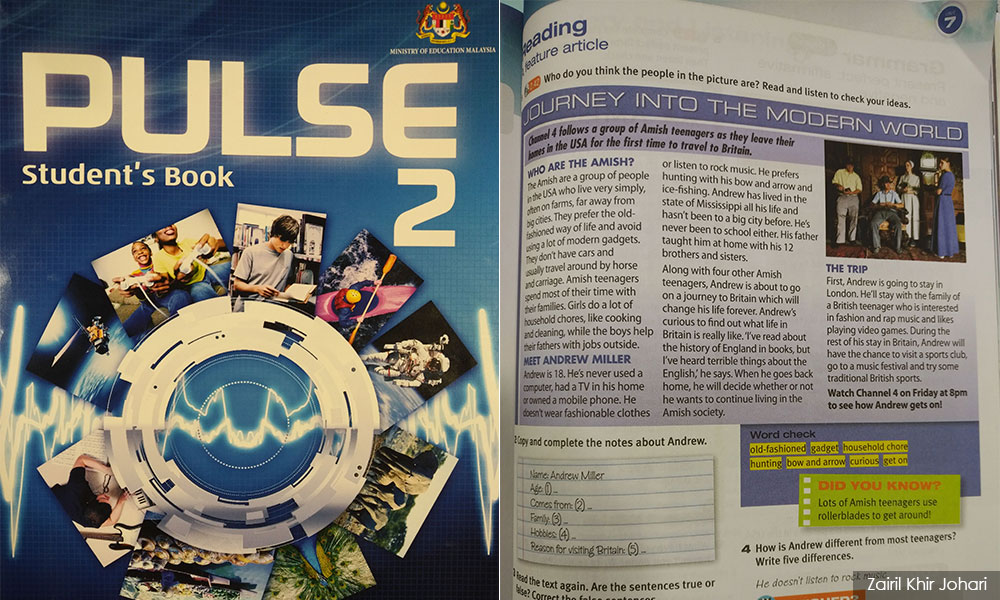LETTER | Ever since I highlighted the controversial replacement of local KSSR and KSSM English Language textbooks for Year 1 and Form 1 students with new “imported” textbooks, many groups and individuals have spoken out against the move.
Academics, education activists, former teachers and teaching groups have taken umbrage at the ill-advised decision for various reasons. Some have criticised the lack of local content and references made to foreign cultural contexts in the textbooks.
Others have questioned the high cost involved and pointed out that there are many local talents who can produce textbooks of similar quality. Meanwhile, some are vexed at the apparent lack of vetting by the Education Ministry in approving the textbooks.
And then there are those who have questioned the suitability of the textbooks and the capacity of local teachers to fully utilise them. This is perhaps the most pertinent question to ask.
Accessibility to digital materials
One major problem that will be faced by teachers and students with the “imported” textbooks is accessibility to audio and video materials.
In both the “Super Minds” and “Pulse 2” textbooks for Year 1 and Form 1 students respectively, almost every page contains references to digital material. Unfortunately, the textbooks provided to Malaysian students do not come with CDs or any other means to access the audio and visual material.

For the “Pulse 2” textbook, only two CDs have been distributed to each school to be used by teachers in the classroom. In other words, it is only during class that the textbooks would be useful. Students and parents who wish to study or do exercises at home would not be able to access the digital content. This effectively means that the textbooks are of little use other than during lessons in the classroom.
This is in contrast to the local KSSM Form 1 English Language textbook by Pelangi, a local publisher. For this book, all audio and video materials can be accessed by scanning the QR code on the cover via an application that can be downloaded online. This makes the textbook’s digital material available to students and parents who wish to practice or study at home.
The lack of accessibility to digital material for the “Pulse 2” textbook is most disappointing given the fact that they cost RM38 a copy, compared to RM7.50 for the KSSM textbook by Pelangi. For those who wish to purchase the CDs in order to access the digital material, the teacher’s edition can be bought at the exorbitant price of RM199 a copy.
How will teachers prepare lesson plans?
Another problem that will be faced by teachers is the lack of guidance in using the new “imported” textbooks. In normal circumstances, the Education Ministry provides a teaching curriculum called Dokumen Standard Kurikulum dan Pentaksiran or DSKP, which serves as a reference guide for teachers to plan their lessons and set exam questions.

Unfortunately, there does not seem to be DSKPs available for the new textbooks.
A check on the Education Ministry’s website reveals there is no DSKP for the teaching of English Language for form 1 and form 2, which are the cohorts that will be using the “Pulse 2” textbooks beginning next year.
However, the DSKP for all other subjects, including language subjects such as Bahasa Melayu, Bahasa Cina, Bahasa Tamil, Bahasa Iban, Bahasa Kadazandusun, Bahasa Semai, Bahasa Perancis, Bahasa Jerman, Bahasa Jepun and Bahasa Arab are available.
As for primary schools, only the DSKP for year 1 English Language seems to be available while the DSKP for Year 2 appears to be missing.
No doubt, experienced teachers will be able to formulate lesson plans without the assistance of DSKPs. However, the majority would require some guidance, particularly when the “imported” textbooks not only contain many references to foreign cultural elements that may be alien to the teachers as well as students, but also stresses on different pedagogical aspects compared to the local KSSR and KSSM curriculum.
Clearly, the sudden decision to switch from local to “imported” textbooks was not carefully planned. Notwithstanding the opaque manner in which these textbooks were procured –without an open tender and at a very high cost, the lack of preparation by Education Ministry will also mean that teachers will be hampered in their attempts to teach their students using these new textbooks.
The views expressed here are those of the author/contributor and do not necessarily represent the views of Malaysiakini.

